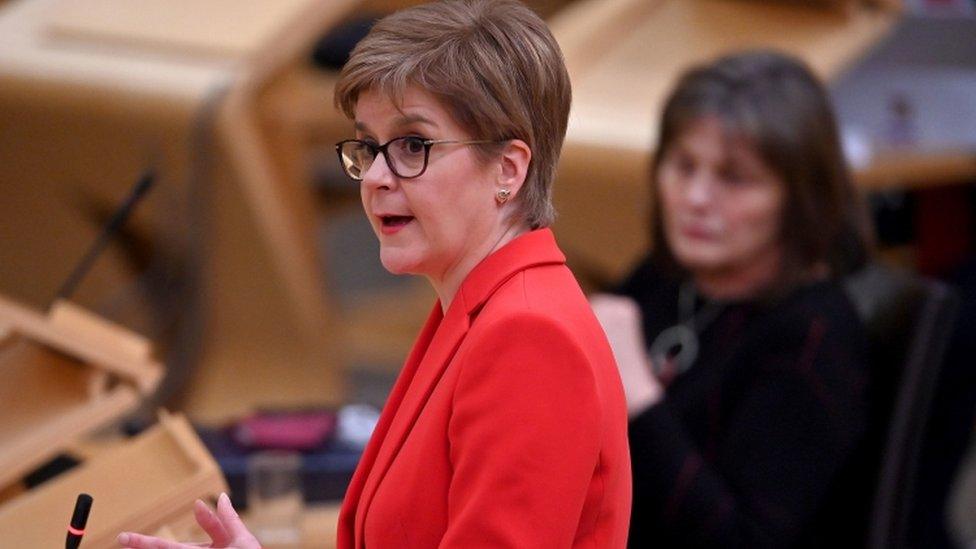Coronavirus: Schools to close under new lockdown in Scotland
- Published
- comments

The first minister announced that tougher restrictions would be introduced at midnight on 4 January
People in Scotland are being told to stay at home while schools there will remain closed, under new lockdown rules.
Scottish First Minister Nicola Sturgeon has announced tougher coronavirus restrictions which will start from Tuesday 5 January and last for the rest of the month.
People living in Scotland will only be able to leave home for essential purposes including exercise, essential shopping and for caring duties. People have been asked to work from home where they can.
All schools will stay shut until the beginning of February at least, and places of worship will be required to close too.
The latest measures in Scotland are similar to those introduced during the lockdown in March.
How do the new lockdown rules affect schools?
The Scottish government had previously announced that pupils would go back to school from the 18 January following a week of online learning.
However, remote learning has now been extended until the end of the month and children won't be back in their classrooms until Monday 1 February.
The aim is to help stop the spread of the coronavirus and the government will review on 18 January whether pupils can return to school on 1 February.
The new measures apply to all nursery, primary and secondary schools, however, vulnerable children and those whose parents or guardians are key workers will not be affected.
Students in Scotland aren't expected to return to the classroom until 1 Febraury
The government is also considering whether and to what extent it can vaccinate school and childcare staff as a priority.
Ms Sturgeon says many teachers will be vaccinated over the coming weeks as part of its priority list.
There are different rules around schools in different parts of the UK.
Why is this new lockdown happening?
The new measures are being introduced because of a significant a rise in the number of coronavirus cases, which Ms Sturgeon says is mainly down to the spread of the new strain of the virus.
This new variant is more transmissible, which means it's able to spread more easily.
She says there is a real risk of the NHS being overwhelmed if the increase in cases isn't brought under control as swiftly as possible.
The vaccine is currently being rolled out in Scotland, but there is still pressure on the NHS
"Possibly the most simple way of explaining the challenge we face right now is to compare it to a race. In one lane we have vaccines - our job is to make sure they run as fast as possible. But in the other lane is the virus which - as a result of this new variant - has just learned to run much faster and has most definitely picked up pace in the last couple of weeks.
"To ensure that the vaccine wins the race, it is essential to speed up vaccination as far as possible. But to give it the time it needs to get ahead, we must also slow the virus down," the first minister said.
The new rules, which are classed as level four restrictions, will apply to all parts of mainland Scotland. However, the country's island areas will remain under level three restrictions and will be closely monitored.
What can people do under the new lockdown rules?
Under the new rules, people will still be able to go outside for physical exercise for as long as they want, but the rules on gathering outdoors will change from 5 January.
A maximum of two people from two different households will be able to meet, down from the previous six people - this only applies to people aged 12 and over.
Essential shops, such as supermarkets, will be able to stay open.
Children whose parents aren't in the same household - that means they don't live together - can still go between their parents' homes.
How long will the new lockdown last?
At the moment, the rules are due to last for the rest of January.
They'll be kept under review but Ms Sturgeon said: "I cannot at this stage rule out having to keep them in place longer, nor making further changes. Nothing about this is easy."
She did add though, that as soon as it is safe to do so, schools and nurseries will be the first places to reopen.
How does the new lockdown in Scotland affect you? Let us know in the comments.
- Published4 January 2021
- Published3 January 2021
- Published7 June 2021
- Published4 January 2021
